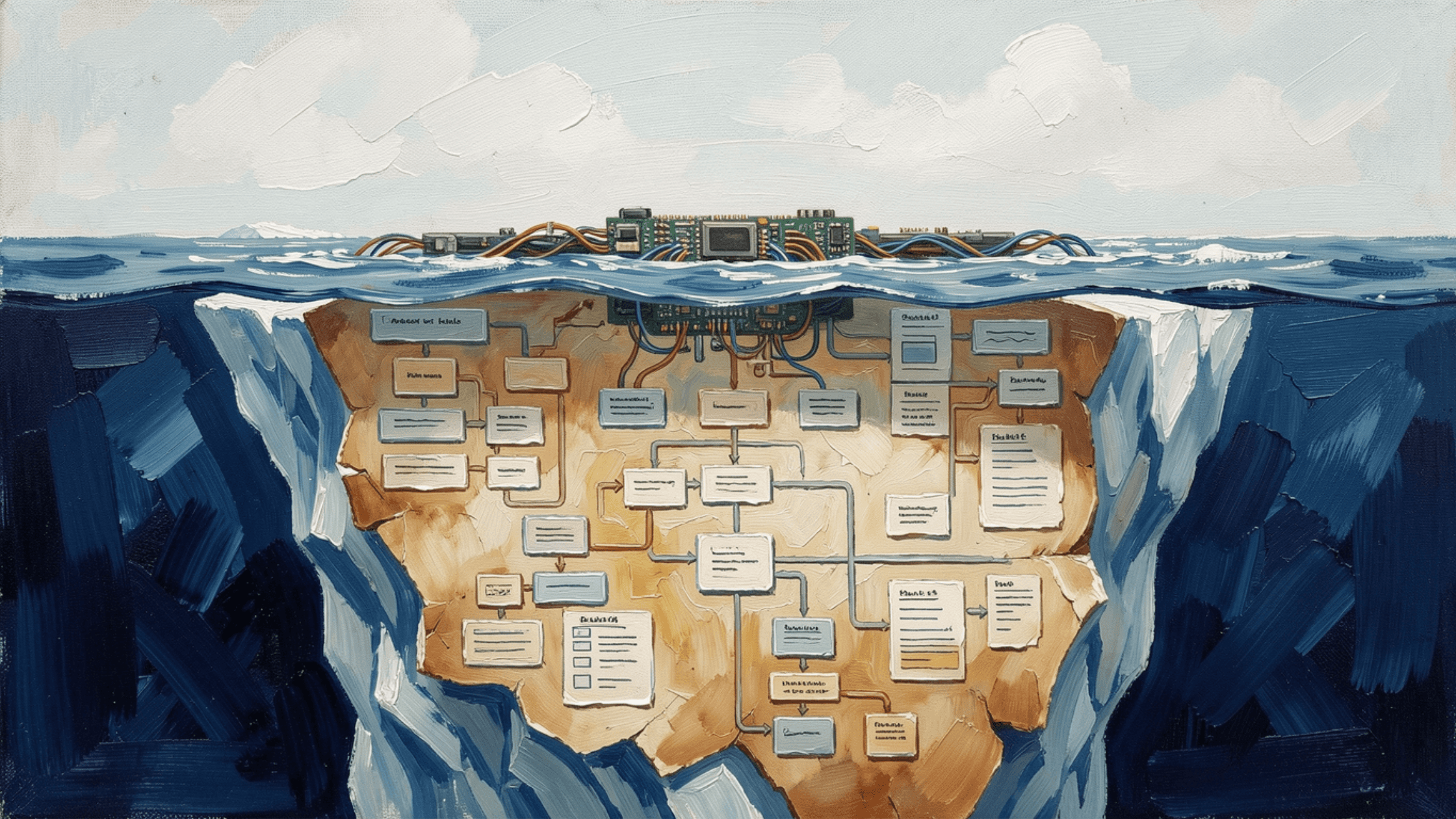Oct 29, 2025
2 min read
OpenAI Launches Atlas: The First AI-Native Browser To Compete with Google Chrome

ChatGPT now lives inside your browser - and it can book flights, write emails, and research competitors while you watch
The browser wars just got an AI upgrade. On October 21, 2025, OpenAI dropped Atlas - not just another browser with AI features bolted on, but the first web browser built from the ground up around artificial intelligence.
This isn't about chatbots in sidebars. Atlas promises something revolutionary: an AI agent that can actually complete tasks across websites, remember what you're working on, and eliminate the endless tab-switching that kills productivity.
For business leaders watching the AI automation space, Atlas represents a massive shift in how AI agents interact with existing business systems. Here's what you need to know.
What Makes Atlas Different From Every Other Browser
It's Built Around AI, Not Built With AI
While Chrome and Edge are adding AI features, Atlas flips the script entirely. When you open Atlas, you're greeted with ChatGPT's search interface - not Google's. The AI isn't a feature; it's the foundation.
Traditional Browser Flow:
Open website → Read content → Copy text → Switch to ChatGPT → Paste → Ask question → Switch back
Atlas Flow:
Ask ChatGPT directly about any webpage → Get instant answers without leaving the page
Three Game-Changing Features
1. Always-Available ChatGPT Sidebar
Every webpage gets an intelligent assistant that can:
Summarize articles in seconds
Extract key data from reports
Answer questions about page content
Help write responses to emails
Analyze competitor websites
Real Example: Reading a 20-page industry report? Ask Atlas: "What are the three biggest trends mentioned here and how do they affect our market?"
2. Browser Memory That Actually Remembers
Unlike your current browser that forgets everything after you close it, Atlas builds context across sessions:
"You were researching CRM software last week"
"You bookmarked three hotels in Dubai but haven't booked yet"
"This article relates to your competitor analysis project"
Real Example: Atlas can say "Based on your research last week, this pricing model is 30% higher than the solutions you were comparing."
3. Agent Mode - The Productivity Game Changer
This is where Atlas gets revolutionary. Agent Mode lets ChatGPT control your browser to complete entire workflows:
Trip Planning: "Find flights to Dubai, check hotel availability, and create an itinerary for our client meeting"
Competitive Research: "Find our top 5 competitors' pricing pages and create a comparison spreadsheet"
Event Planning: "Research restaurants in downtown Abu Dhabi, check availability for Friday night, and book a table for 8"
The AI opens tabs, reads websites, fills forms, and reports back - while you watch or work on other things.
Why This Matters for Business Automation
The Real-World Impact
Atlas demonstrates what happens when AI agents can interact with your actual business tools instead of just talking about them.
Before Atlas:
Employee spends 2 hours researching vendors
Manually copies data between 15 websites
Creates comparison spreadsheet by hand
Emails results to team
With Atlas:
"Research our top 10 potential vendors, compare their pricing and features, and email the analysis to the procurement team"
Agent completes the entire workflow in 20 minutes
The Enterprise Implications
Atlas isn't just a browser - it's a preview of how AI agents will transform knowledge work:
End of Manual Research: No more spending hours jumping between websites to gather information
Context-Aware Assistance: AI that remembers your projects and priorities across sessions
Task Automation: Complex multi-step workflows completed with simple natural language commands
Current Limitations: The Reality Check
It's Mac-Only (For Now)
Atlas launched exclusively for macOS, with Windows, iOS, and Android "coming soon." This limits immediate business adoption.
Agent Mode Requires Premium
The most powerful features (Agent Mode) are limited to ChatGPT Plus, Pro, and Business subscribers ($20+/month).
It's Still Beta
Early reviews suggest Agent Mode works well for simple tasks but struggles with complex workflows. Expect some trial and error.
Security Questions
Giving an AI agent access to your browsing data, login credentials, and ability to take actions raises important security considerations for enterprise use.
The Competitive Response Is Already Here
Atlas didn't launch in a vacuum. Within days, competitors responded:
Microsoft: Enhanced Edge with "Copilot Mode" - deeper AI integration across Windows Google: Accelerated AI features in Chrome, including smarter search summaries Startups: The Browser Company's Dia, Opera's enhanced Aria, and others are racing to compete
The message is clear: AI-powered browsing is the new battleground.
What This Means for Enterprise AI Strategy
The Bigger Picture
Atlas represents the evolution from "AI assistants" to "AI agents" - systems that don't just answer questions but complete tasks.
For business leaders, this shift raises critical questions:
How do we prepare for AI agents that can interact with our business systems?
What security frameworks do we need when AI has browser-level access?
How do we train teams to work effectively with AI agents?
The Production Reality Check
While Atlas shows impressive capabilities, it also highlights the gap between demo-worthy AI and production-ready business automation:
Demo: AI agent books a restaurant reservation perfectly
Production: AI agent needs to integrate with your expense system, follow company policies, and handle edge cases
Should Your Business Consider Atlas?
The Case For Early Adoption
Competitive Intelligence: Faster, more comprehensive competitor research
Content Creation: AI-assisted writing with full context from source materials
Market Research: Automated data gathering across multiple sources
Productivity Boost: Eliminate routine browsing tasks for knowledge workers
The Case For Caution
Security Risks: New platform with limited security track record
Platform Limitations: Mac-only launch limits team adoption
Learning Curve: Teams need training on effective AI agent use
Reliability Questions: Beta features may not be ready for critical business processes
The Bottom Line: A Glimpse of the Future
Atlas isn't perfect, but it's significant. It shows us what AI-powered work will look like when agents can actually interact with business systems instead of just talking about them.
For early adopters: Atlas offers a chance to experiment with next-generation AI assistance and gain experience with agentic workflows.
For enterprises: Atlas demonstrates why building secure, reliable AI automation infrastructure matters more than rushing to adopt the latest AI trends.
For everyone: This is just the beginning. AI agents that can browse, research, and complete tasks will become the norm, not the exception.
The question isn't whether AI agents will transform how we work online - it's whether you'll be ready when production-ready versions arrive.
What's Next?
OpenAI promises Windows and mobile versions "soon," along with improvements to Agent Mode reliability and new enterprise features.
But Atlas has already accomplished something important: it's shown the entire tech industry what AI-native applications look like. Every browser, every productivity tool, every business system will now be evaluated against this new standard.
The age of AI agents isn't coming - it's here. Atlas just made that impossible to ignore.
Ready to prepare your business for AI-powered automation? Learn how to build secure, reliable AI agents that actually work in production.
Quick Facts: Atlas at a Glance
📅 Launch Date: October 21, 2025
💻 Platforms: macOS (Windows/iOS/Android coming soon)
💰 Pricing: Free tier available, Agent Mode requires paid ChatGPT subscription
🎯 Target: Knowledge workers, researchers, content creators
⚡ Key Innovation: AI agent that can control your browser and complete tasks
🔒 Enterprise Ready: Not yet - security and management features still developing





